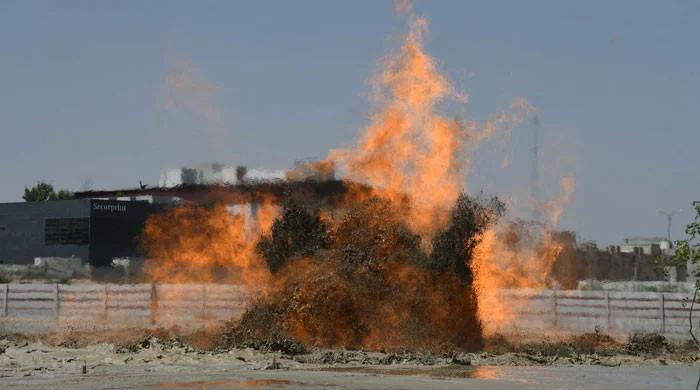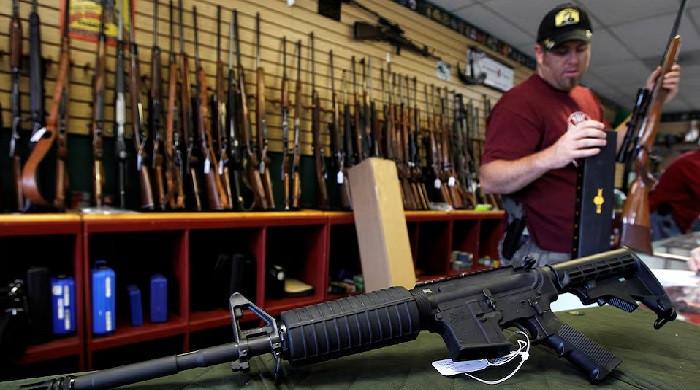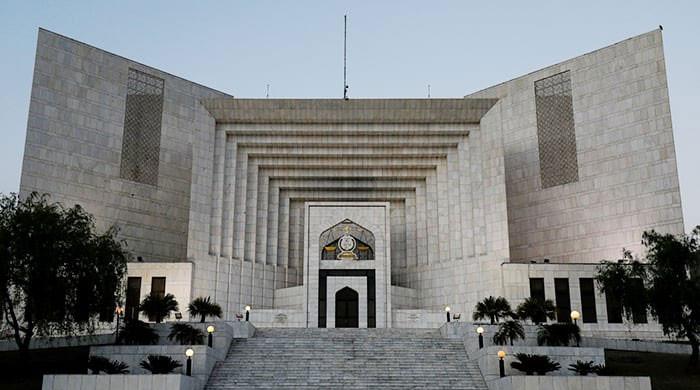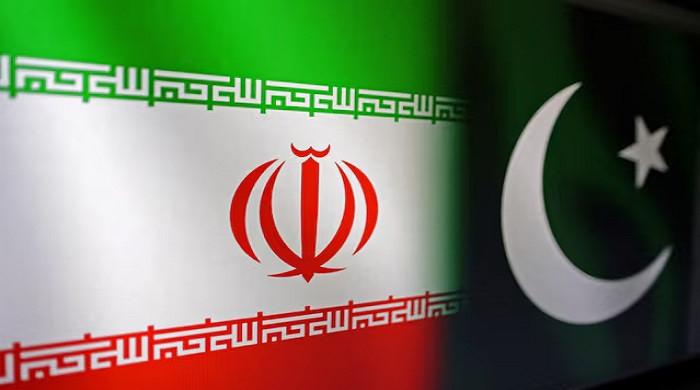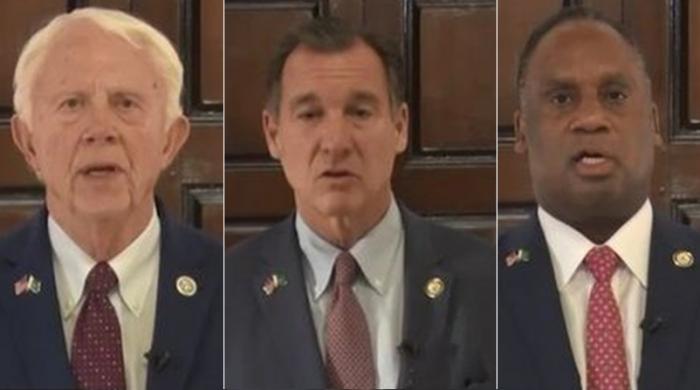A joyless victory
Then PM Nawaz Sharif after appearing before the Panama case JIT in June. Photo: AFP
One fundamental problem of living in autocracies is being consigned to binaries; in our case between a flawed...
August 01, 2017
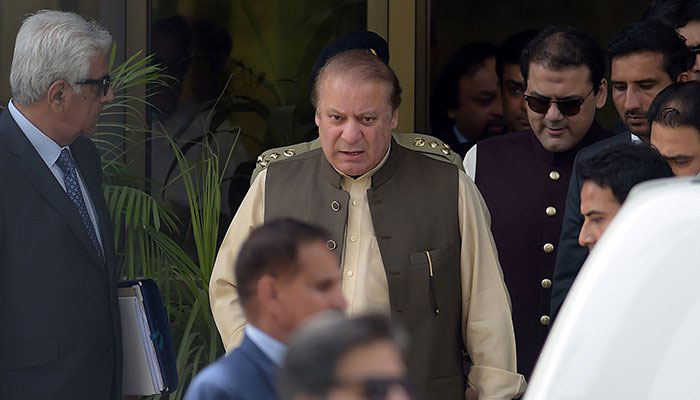
One fundamental problem of living in autocracies is being consigned to binaries; in our case between a flawed conception of democracy and accountability. It is either a "judicial coup" or "a new era of accountability." Nawaz Sharif is either a "helpless, innocent civilian" or "an all powerful despot using the pretence of parliamentary legitimacy." The Supreme Court is either "a mere proxy of the military" or "the guardian of our collective national conscience." All of this is hyperbole and it deliberately overlooks institutional and personal explanations of what brought us here.
The Panama papers verdict was not about elevated principles of democracy, constitutionalism and accountability. It is elite infighting. The fact that an external event, the Panama papers revelations, ignited this round makes this even more complex. Yet, the choice offered is unflattering, between an arrogant political dynasty apparently caught with their hand in the till or unelected judges and generals deciding our destiny on personal preference. There is no reason to celebrate. This is neither a victory for accountability nor a great setback for democracy.
Did the establishment restrain Sharif from repealing Article 62 and 63 and other Zia-ul-Haq mutilations from the constitution? Did the Supreme Court prevent him from showing up in the parliament? Did the Army force Sharif to don lawyer robes and go to court in the ridiculous Memo case and cheer the disqualification of then-Prime Minister Yusuf Raza Gilani? Only the most gullible will believe that a conspiracy resulted in uniform police officers shooting stone throwing women in Shahbaz Sharif's Lahore, where police encounters are rewarded. Who with a straight face can defend the Qatari letter and the Calibri font fiasco? Does anyone expect the National Accountability Bureau and the Securities & Exchange Commission of Pakistan to be impartial investigators of any prime minister?
Nawaz Sharif has made a career of doing politics by other means via Generals, IJIs and Iftikhar Chaudhary's. Those cautioning against judicialization of political disputes by Sharif were labelled as defenders of corrupt leaders and maligning the judiciary. The post-Iftikhar Chaudhary judiciary sees itself as a legitimate power player, it helps for them to know that the military is on their side; this is not necessarily an active conspiracy, it is just simple power politics of aligning with one power broker to go after another one. The Supreme Court has traditionally been a marginal player becoming relevant only to rubber stamp the victor once the civil-military power struggle is over (always the same result). The post-Iftikhar Chaudhary Supreme court has tasted power and now wants a different and more relevant role, it wants to be an arbiter of political disputes and Nawaz Sharif and Imran Khan are here to oblige.
The elite schism will still manifest itself in multiple ways. The conservatives in large numbers amongst the PML-N supporters, while feeling short changed at his removal, will not be comfortable with the "Sadiq" and "Ameen" provisions to be rightly expunged.
Accountability in Pakistan has been selective, targeted and anti-democratic starting from PRODA and EBDO and continuing to Musharraf's NAB. One is sure even Nawaz Sharif cannot term Saif-ur-Rehman's Ethesab bureau as democratic, or at least one hopes he doesn't.
Judges and generals have never been held accountable and it is either naive or disingenuous to maintain that the Panama verdict will change that.
The Supreme Court should not be a trial court and the piety requirements inserted by a hypocritical dictator are nonsensical. The intelligence agencies have no place in any financial investigation of a political leader. The Joint Investigation Team used all material that the security establishment collected on Sharif since 1999 and published it as the grand, record paced expose.
There is also another important distinction at play here between perceived procedural and substantive conception of justice. Nawaz Sharif and his family made a shifty and contradictory defense and Sharif is not a martyr in any cause greater than himself and the family fortunes. However, that does not make the Supreme Court's actions desirable. The problem with the "get Nawaz" operations, like with any individual specific operation, is that nothing really changes for the better. The judgment while heavy on polemic disqualifies Sharif in all of five lines, no parameters of accountability have been set. One Sharif replaced with another or with the self-righteousness of Imran Khan or the unthinkable candidate, Sheikh Rashid, is neither policy nor anyone but the electorate's decision.
If the intention was and is to take full stock of the alleged corruption of the house of Sharif, it has to be done publicly and thoroughly and with the collaborators as co-accused. The list of collaborators is long and comprises the entire spectrum of the power elite, the Generals who were the architects of the IJI, the industrial tycoons who bought state enterprises for a pittance amongst others.
Given the elaborate and inglorious history of accountability of politicians in the country, this is not to be attempted feebly.
The definition of corruption has to be expanded beyond that which exists in the imagination of the urban middle class and is restricted to individual financial embezzlement.
Nawaz Sharif will rightly face a criminal trial and one hopes the standards of fair trial are adhered to. The temptation is to say that given his past record this is deliciously ironic and chickens coming to roost. However, the "get Nawaz" operation can become the "get democracy" project rather quickly and hence those wanting Sharif to be held to account should demand a transparent, credible system which has the capacity to do so, equally for Sharif and Musharraf. Cleanse the Constitution from Zia's abominations, appoint independent chairpersons of the NAB and SECP and make the parliament the final arbiter of political disputes.
Imran Khan will ignore at his own peril what Sharif ignored while cheering on the dismissal of Yusuf Raza Gilani, else "chiragh sab kay bujehian gay, Hawa kiski nahien."
So all sides should save the mithai and get to work.
- Ijaz is a lawyer and the country representative for the Human Rights Watch.
Note: The views expressed are those of the author, and do not reflect the official policy or position of Geo News or the Jang Group.




